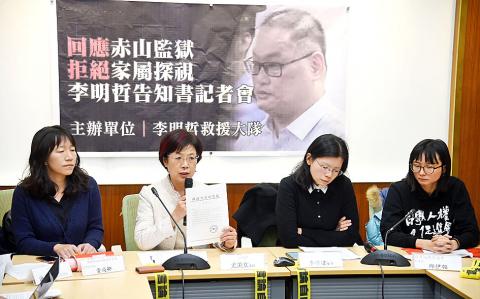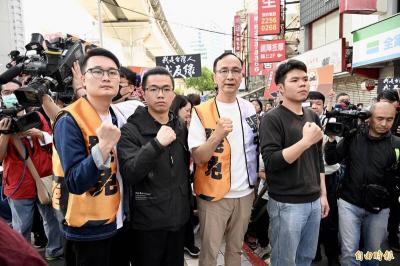Civic groups yesterday condemned Chinese authorities for banning Lee Ching-yu (李凈瑜) from visiting her husband, jailed Taiwanese human rights advocate Lee Ming-che (李明哲), and called for his release.
“Chinese authorities’ decision to ban family visitation during the Lunar New Year period, a time of family reunion, is inhumane and shameful,” Taiwan Association for Human Rights secretary-general Chiu Ee-ling (邱伊翎) told a news conference in Taipei.
Lee Ching-yu was honest about her husband’s situation in Hunan Province’s Chishan Prison, Chiu said.

Photo: Huang Yao-cheng, Taipei Times
“No prisoners or their family would deliberately tell lies to risk more punishment,” she added.
Lee Ching-yu on Dec. 24 last year told a news conference that the prison had mistreated her husband by throwing away his warm clothing, serving him spoiled food and making him work more than 10 hours per day.
They also froze his bank account, refused to activate his telephone card and prevented him from receiving letters and books from family, she said.
On Monday, Lee Ching-yu received a letter from prison officials informing her that she has been banned from visiting her husband for three months, from Wednesday last week to April 22, because her public comments “deviated” from the facts and would “hinder” his rehabilitation.
“All of my visits to the prison were monitored by the Chinese government. What I said about the prison after returning to Taiwan was based entirely on what I saw and heard there,” Lee Ching-yu said.
Lee Ming-che had asked her to “tell everyone” about his situation after her return to Taiwan, telling her that “there is a lot more I have not told you,” she said.
She added that if her words diverted from the facts, the prison can release videos of their meeting.
“My husband is in your prison. What leverage do I have to spread lies? If I lied, you can immediately expose me,” Lee Ching-yu said.
“Why would human rights hinder a prisoner’s rehabilitation? Not to mention that Lee Ming-che is innocent,” she added.
She said that if Chinese authorities would not allow her to visit Lee Ming-che, they should at least allow civic groups and the Mainland Affairs Council to visit him.
“What China is doing is extending its crackdown on freedom of speech to Lee Ming-che’s family,” Democratic Progressive Party Legislator Yu Mei-nu (尤美女) said.
Banning family visitation is not only against universal humanitarian values, but against the UN Standard Minimum Rules for the Treatment of Prisoners and China’s own law on imprisonment, she said.
The prison could continue to mistreat Lee Ming-che if his family is not allowed to visit, Amnesty International Taiwan director Annie Huang (黃尚卿) said.
“Chinese authorities should respect freedom of speech and release Lee Ming-che,” she said, adding that his family has the right to visit him.
To show support for Lee Ming-che, civic groups said that they have been urging the public to send postcards to him in prison and tag him On social media on Lunar New Year’s Eve.
They have sent more than 70 letters to him, they said.

The Ministry of Economic Affairs has fined Taobao NT$1.2 million (US$36,900) for advertisements that exceeded its approved business scope and ordered the Chinese e-commerce platform to make corrections in the first half of this year or its license would be revoked. Lawmakers have called for stricter supervision of Chinese e-commerce platforms and more stringent measures to prevent China from laundering its goods through Taiwan as US President Donald Trump’s administration cracks down on origin laundering. The legislature’s Finance Committee yesterday met to discuss policies to prevent China from dumping goods in Taiwan, inviting government agencies to report on the matter. Democratic Progressive Party

Taiwan and its Pacific ally Tuvalu on Tuesday signed two accords aimed at facilitating bilateral cooperation on labor affairs, according to Taiwan’s Ministry of Foreign Affairs (MOFA). The governments inked two agreements in Taipei, witnessed by Foreign Minister Lin Chia-lung (林佳龍) and visiting Deputy Tuvaluan Prime Minister Panapasi Nelesone, MOFA said in a news release. According to MOFA, the agreements will facilitate cooperation on labor issues and allow the two sides to mutually recognize seafarers’ certificates and related training. Taiwan would also continue to collaborate with Tuvalu across various fields to promote economic prosperity as well as the well-being of their

Taiwan would welcome the return of Honduras as a diplomatic ally if its next president decides to make such a move, Minister of Foreign Affairs Lin Chia-lung (林佳龍) said yesterday. “Of course, we would welcome Honduras if they want to restore diplomatic ties with Taiwan after their elections,” Lin said at a meeting of the legislature’s Foreign Affairs and National Defense Committee, when asked to comment on statements made by two of the three Honduran presidential candidates during the presidential campaign in the Central American country. Taiwan is paying close attention to the region as a whole in the wake of a

The Taipei District Prosecutors’ Office has continued its investigation into allegations of forged signatures in recall efforts today by searching the Chinese Nationalist Party’s (KMT) city chapter and questioning several personnel including the chapter director, according to media reports. Among those questioned and detained were KMT Taipei chapter director Huang Lu Chin-ju (黃呂錦茹), chapter secretary-general Chu Wen-ching (初文卿), chapter secretary Yao Fu-wen (姚富文) and first district committee executive director Tseng Fan-chuan (曾繁川). Prosecutors said they would not confirm reports about who had been summoned. The investigation centers on allegations that the ongoing recall campaigns targeting Democratic Progressive Party legislators Rosalia Wu (吳思瑤)